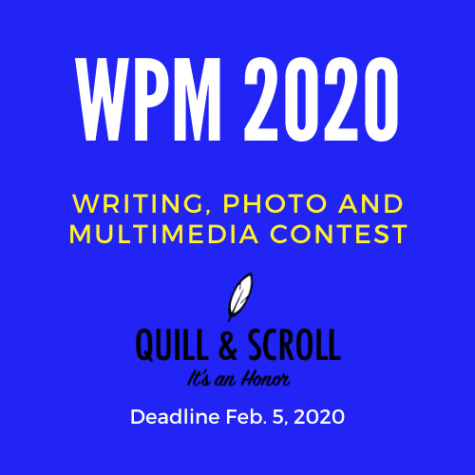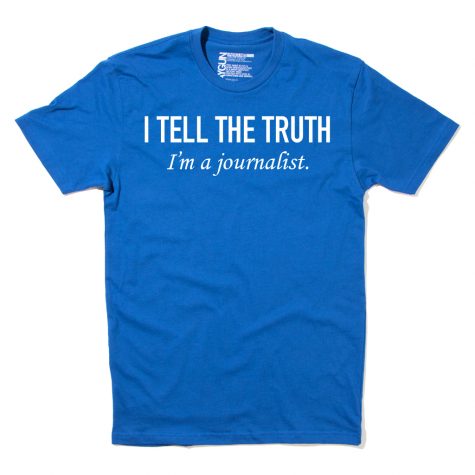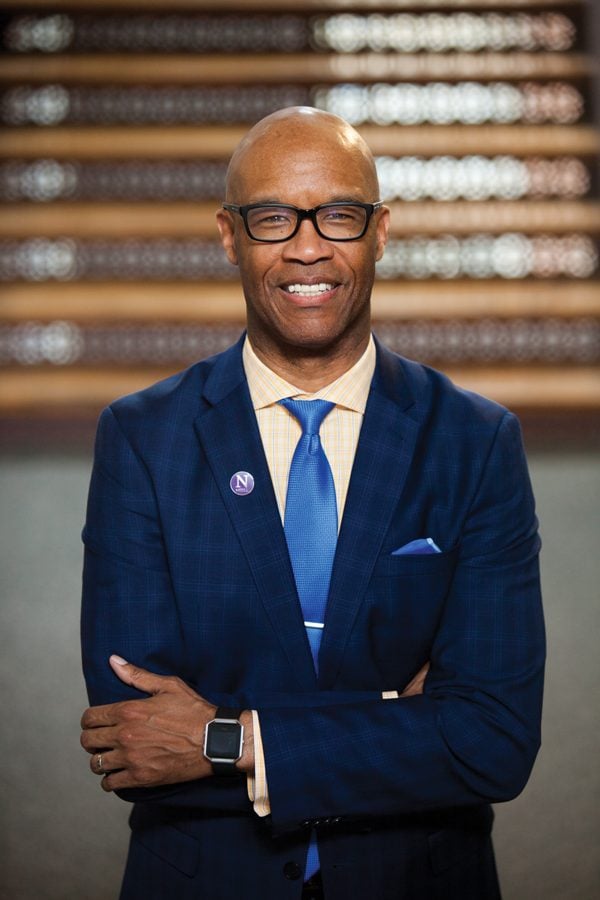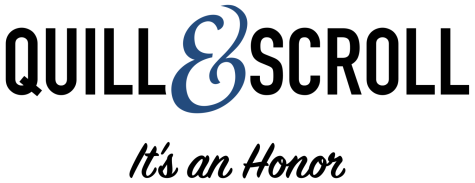THE WEEKLY SCROLL
November 15, 2019
News, tips and advice from Quill and Scroll
The Lede
WHAT. A. WEEK.
Impeachment moves into second day
This oughta make that National High School Journalism Conference in D.C. interesting, eh? Still, before we all descend on the nation’s capital Nov. 20-24, Congress will already be busy with impeachment.
The U.S. House of Representatives this morning will hear from another witness who purports to have knowledge of President Donald Trump’s alleged scheme to withhold Congressionally approved funds from Ukraine in exchange for personal political favors.
Former U.S. Ambassador to Ukraine Marie Yovanovitch will speak to the legislators beginning at 9 a.m. EST. Several television broadcast and cable networks will carry it live. Yovanovitch was ousted from her post by the Trump administration earlier this year.
The first two witnesses in the public impeachment inquiry testified to Congress Wednesday. Ambassador William Taylor, the top U.S. diplomat to Ukraine, and George Kent, a U.S. Department of State employee told the House Intelligence Committee that it was clear to them that Trump was using U.S foreign policy to advance his personal political agenda.
Republicans countered by saying that Taylor and Kent had only “second-hand knowledge” of Trump’s conversations with others and called for the original whistleblower to be subpoenaed to appear in front of the committee. U.S. whistleblower statutes, however, contain provisions to keep the identity of whistleblowers from being revealed. Further, others in the White House who might have knowledge of the president’s conversations are being forbidden by the White House to appear in front of Congress.
Republicans also are trying to prove that Ukraine interfered in the 2016 U.S. election in greater or equal proportion to the Russians, whom U.S. intelligence identified as the biggest threat to U.S. elections in both 2016 and in 2020.
Testimony scheduled for next week will come from State Department officials and National Security Council staffers, including Lt. Col. Alexander Vindman.
Once the House Intelligence Committee finishes hearing from witnesses, it will vote to either end the impeachment inquiry or send it to the entire House of Representatives for a vote on impeachment. If the House votes to impeach, the U.S. Senate will hold a trial of the president. Both previously impeached presidents — Bill Clinton in 1998-99 and Andrew Johnson in 1868 — were acquitted in the Senate, where a two-thirds vote is required for a president to be removed from office.
Snapchatting cheerleader back in court
A cheerleader kicked off her high school squad for a profanity-laced Snapchat post aimed at her high school was back in court this week defending her First Amendment rights.
The girl was booted from the JV squad in 2017 after having not been chosen for varsity and subsequently posting “f*** school, f*** softball, f*** cheer, f*** everything” on her Snapchat account.
A federal judge ruled earlier this year that the girl’s posts were protected as free speech under the First Amendment. The school is appealing that decision.
Not again . . .
Thursday’s shooting at Saugus High School in Santa Clarita, California has left another U.S. community in tears.
It also serves as a reminder of how difficult it is to be a journalist, particularly when you’re part of the community in which the tragedy occurs. Here’s an article from 2017 about how journalists can respectfully cover such horrific events.
It’s An Honor
Q&S podcast interviews international journalist Susanne Fowler
Listen to THE SOURCE, Quill and Scroll’s podcast, as host Sylvia Clubb, interviews Susanne Fowler, a reporter and editor who has worked for several news outlets, including the New York Times. Susanne is also a member of Quill and Scroll, having been inducted in the 1970s at her alma mater, Cedar Rapids (Iowa) Kennedy High School.
Contest updates
We will announce all winners in the 2019 Yearbook Excellence Contest in early December 2019.
Quill and Scroll has updated the the 2020 Writing, Photo and Multimedia Contest so that it rewards students with the kind of work they regularly produce in their newsrooms.
New contest categories include:
- Portrait Profile Photo — This is likely to be an environmental portrait of a person or a group of people. These sorts of photos usually accompany a profile story.
- Documentary Video — This is not a news video, but a non-fiction project that your students may have completed that feels more like a film. It can be any length longer than five minutes. Traditional news packages should be entered in the Video Package categories: news, sports and features.
- News Show for Web or TV: Single Episode — Submit a single show of between five and 30 minutes, produced either for cable and/or web.
Quill and Scroll will also award Blue and Gold Awards in three areas this year:
- Comprehensive Writing (Categories 1-11 below)
- Comprehensive Visuals (Categories 12-24)
- Comprehensive Multimedia (Categories 25-30)
In addition, Blue and Gold Awards will be given for overall excellence. McCallum High School in Austin, Texas has earned that crown each of the past two years.
Entry forms will be available Dec. 3, 2019. The contest deadline remains Feb. 5, 2020. As always, the top 10 percent of all entries in every category qualify the student who produced it for the Quill and Scroll scholarships in their senior year.
Here are the 2020 contest categories:
- Editorial Writing
- News Writing
- Feature Writing
- Opinion Writing
- Review Writing
- In-Depth Reporting: Individual
- In-Depth Reporting: Team
- Sports Writing
- Profile Writing
- Political Writing
- Health, Science and Agriculture Writing
- News Feature Photo
- Sports Action Photo
- Sports Reaction Photo
- Photo Illustration
- Photo Slideshow
- Profile Portrait
- Cartoon
- Informational Graphic
- News Mag Cover Design
- News Front Page Design
- Feature Page Design
- Sports Page Design
- Editorial Page Design
- Video News Package (up to five minutes)
- Video Sports Package (up to five minutes)
- Video Feature Package (up to five minutes)
- Documentary Video (Single subject, five minutes or longer)
- Audio Podcast Single Episode (any length)
- News Show for Web or TV, Single Episode — 5:00 to 30:00
Official Quill and Scroll video!
Discover the rich history behind Quill and Scroll’s founding principles and organizational practices. Click that play button below to join our journey, understanding how we developed and progressed over the years. From 1926 to today, we are an organization dedicated to honoring quality student journalist work, providing students and their advisers with resources to do that great work and have it recognized.
Video accredited to Roman Slabach from The Daily Iowan.

“I TELL THE TRUTH” t-shirts available for your staff
Now is the time to order your Quill and Scroll “I TELL THE TRUTH — I’m a journalist” t-shirts. As you know, “Truth” is the first pillar upon which Quill and Scroll was founded in 1926.
Every time we get to 100 t-shirts ordered, we’ll print up a new batch and ship them to you. All profits will go to the Quill and Scroll Scholarship Fund, which benefits Quill and Scroll members who plan to study journalism in college.
Just fill out the form at this link to tell us how many you want in each size. We’re offering a unisex style and a female-fit style. RAYGUN is printing the shirts for us, and you can read about their “USA-made” t-shirts here.
Of course, we’d like every Quill and Scroll member to wear one, but these shirts are good for any journalist.
We will accept only credit card payments, and there’s a per-order charge for that, so order all your t-shirts at one time and save!
What’s Viral?
Northwestern journalists face backlash after coverage of Jeff Sessions visit
The Daily Northwestern faced backlash first for its coverage of a student-led protest of former Attorney General Jeff Sessions’ visit to campus, and then for an apology statement released in an attempt to mend fences with students who felt traumatized by the newspaper’s coverage — including interviews and photography — of the Nov. 5 protest.
“Some protesters found photos posted to reporters’ Twitter accounts re-traumatizing and invasive… We recognize being contacted like this [by text message] is an invasion of privacy,” the editorial stated. The apology centered around ways in which student protesters felt they had been harmed by the coverage of the protest. The backlash from students, however, was nothing compared to the backlash the student-journalists faced from professionals in the industry.
This is called reporting. Why are you apologizing for it? Mind-boggling to read this editorial from student journalists who attend one of the top schools for journalism in the country. https://t.co/1GRPbfV8Yr pic.twitter.com/8Hf3DAFz9w
— Amy Brittain (@AmyJBrittain) November 12, 2019
Amy Brittain, a reporter for The Washington Post’s Investigative team
Apologizing for the sin of committing journalism. This is chilling and a sign of more to come: https://t.co/hrIZr1j7GQ
— Bari Weiss (@bariweiss) November 12, 2019
Bari Weiss, staff editor and writer for The New York Times Opinion section
So Northwestern’s student newspaper apologized for the trauma brought on by its coverage of a Jeff Sessions speech on campus?! When I read articles like these I feel like the country has gone insane. https://t.co/mRET986F0q
— Clay Travis (@ClayTravis) November 12, 2019
Clay Travis, Fox Sports Radio host and Lock it In TV show host
Interviewing participants as well as photographing an event is at the center of journalism; it is how stories are covered factually. In order to gather facts, journalists must hear from direct participants in the event at hand. The backlash focused on the position of Northwestern as one of the foremost journalism school’s in the country; its example in apologizing for doing “basic journalistic reporting” places feelings at a higher value than truth.
The Chicago Tribune’s opinion editorial regarding the event states, “Closson, as the third African American editor in Daily history, explained on Twitter that he thought he had a responsibility to gain readership from students of color who had felt alienated from the newspaper. That’s an appropriate goal, but here’s what news organizations owe their audiences: thorough, fair-minded coverage via energetic and creative reporting — not pandering to public sentiment. Readers (students included) who are pampered and protected remain uninformed.”
Journalism professionals are highlighting that journalism isn’t about feelings: it’s about reporting the truth. Reporting on tough topics is hard; however, it does not mean the topics should be avoided.
Because sometimes people *want* to talk. Sometimes they understand there is a greater good at stake, or that talking helps. If you show them enough empathy, they might even — one day — be grateful you called.
— Kevin Van Valkenburg (@KVanValkenburg) November 12, 2019
Kevin Van Valkenburg, Senior Writer for ESPN
Former program director for a college journalism program and current Poynter website editor Barbara Allen had this to say about the backlash The Daily reporters faced surrounding both their initial coverage of the protest and their Editorial apology: “Northwestern students have learned in the toughest way possible what it’s really like to be a journalist: Sources are going to push you and make demands, more knowledgeable elders are going to tell you just how wrong you are, and it’s all going to play out in public. And this is exactly how it should be, because these experiences turn you into a good journalist.”
The event poses questions about the future of journalistic reporting and how to move forward covering sensitive topics. How would you, as a high school student-journalist, respond to a request to remove content because someone feared the coverage would hurt them in the future? Do you have a policy regarding take-down requests of information already published?
Instagram moves to hide likes from feed
Instagram will begin testing hiding likes from public view in the U.S. next week, according to an interview with Instagram CEO Adam Mosseri on WIRED25. According to researchers, “…when users tailor their content to whatever garners the most engagement (or outrage), the result is a radicalized environment that makes healthy, happy conversations almost impossible.”
Instagram is just one of many social media companies testing out hiding engagement information from public view. Facebook, Twitter and YouTube have all tested hiding the content from the public.
Hiding engagement information is one of Mosseri’s latest tactics in making Instagram the, “safest place on the internet.”
Heads up! We've been testing making likes private on Instagram in a number of countries this year. We're expanding those tests to include a small portion of people in the US next week. Looking forward to the feedback!
— Adam Mosseri (@mosseri) November 9, 2019
The experiment will only affect select Instagram users.
Journalism students in conflict with school district regarding freedom of student expression
Naperville Central High School in Naperville, Illinois recently argued their rights as journalists under Illinois’ New Voices Law were compromised after the school district censored and delayed the release of a news story run in their Oct. 29 Issue.
The Central Times newspaper made the executive decision to write — and run — a story regarding disruptions in the classroom caused by a disabled student. The disabled student was not the heart of the article, but rather a small focal point opening up lines of communication about classroom disruptions and the effects on students’ ability to learn. In making the decision to run that article, The Central Times consulted the principal of Naperville Central – who then consulted the school district – regarding the running of the story. The school board deliberated for some time, finally deciding that the article may be ran, but censored.
The students decided to run a complementary story with the article on the front page of the paper discussing their rights as student journalists and the illegality of the censorship.

Front page of The Central Times Oct. 29 issue
The paper was then held within the principal’s office for 24 hours after its delivery to the school, preventing its distribution.
The students felt that their rights under Illinois’ New Voices Law were being compromised. The law states that censorship of public school newspapers is only allowed if the content:
- Is libelous, slanderous or obscene
- Constitutes an unwarranted invasion of privacy
- Violates federal or state law
- Incites students to commit an unlawful act, to violate policies of the school district, or to materially and substantially disrupt the orderly operation of the school.
The principal and the school district defended their censorship as constituting an unwarranted invasion of privacy; the content that was censored revolved around the actions of the disabled student’s disruptions within the classroom. The staff felt differently.
The question is now who was in the wrong: the students or the principal and school district.
Read more about this issue here.
Free Spirit Journalism Conference sets 2020 dates
The Al Neuharth Free Spirit and Journalism Conference for high school students is set for June 19-24 in Washington, D.C. The conference is for high school journalists in the class of 2021 (rising seniors) who want to be professional journalists and who demonstrate — through their application — that they embrace the “free spirit” embodied by Mr. Neuharth.
The application process is open, and the deadline for applications is Feb. 1, 2020. One student from all 50 states and the District of Columbia will be selected for the conference.
Just a Thought

Photo Courtesy of Charles Whitaker for The Daily Northwestern
Covering the truth rather than protecting feelings
The dean of Northwestern’s school of journalism, Charles Whitaker, released a statement Tuesday regarding the events and backlash that ensued after The Daily Northwestern‘s coverage of the protests stemming from the appearance of Jeff Sessions on campus. Here are a few of his remarks on the merit of the journalists covering the event:
“The coverage by The Daily Northwestern of the protests stemming from the recent appearance on campus by former Attorney General Jeff Sessions was in no way beyond the bounds of fair, responsible journalism. The Daily Northwestern is an independent, student-run publication. As the dean of Medill, where many of these young journalists are trained, I am deeply troubled by the vicious bullying and badgering that the students responsible for that coverage have endured for the “sin” of doing journalism.
I might offer, however, that their well-intentioned gesture sends a chilling message about journalism and its role in society. It suggests that we are not independent authors of the community narrative, but are prone to bowing to the loudest and most influential voices in our orbit. To be sure, journalism has often bowed to the whim and will of the rich and powerful, so some might argue that it is only fair that those who feel dispossessed and disenfranchised have their turn at calling the journalistic shots. But that is not the solution. We need more diversity among our student journalists (and in journalism writ large). We need more voices from different backgrounds in our newsrooms helping to provide perspective on our coverage. But regardless of their own identities, our student journalists must be allowed—and must have the courage—to cover our community freely and unfettered by harassment each time members of the community feel they have been wronged.”
Read the rest of his statement here.
